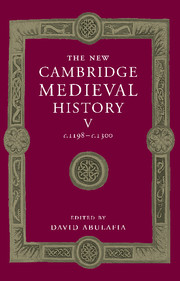Book contents
- Frontmatter
- Introduction
- Part I Common Themes
- Part II The Church in the Thirteenth Century
- Part III The Western Kingdoms
- Part IV Italy
- Part V The Mediterranean Frontiers
- 17 Byzantium after the Fourth Crusade
- 18 The crusades
- (a) The thirteenth-century crusades in the Mediterranean
- (b) The crusader states
- 19 Islam and the Mediterranean
- 20 The rise of Aragon-Catalonia
- 21 Castile, Portugal and Navarre
- Part VI The Northern and Eastern Frontiers
- Appendix Genealogical tables
- Primary sources and secondary works arranged by chapter
- Index
- Plate section
- Map 1 Europe in the thirteenth century
- Map 3 France, c. 1260
- Map 5 Germany and the western empire
- Map 6 Genoa, Venice and the Mediterranean
- Map 8 The Latin empire of Constantinople and its neighbours
- Map 10 Aragon and Anjouin the Mediterranean">
- References
(a) - The thirteenth-century crusades in the Mediterranean
from 18 - The crusades
Published online by Cambridge University Press: 28 March 2008
- Frontmatter
- Introduction
- Part I Common Themes
- Part II The Church in the Thirteenth Century
- Part III The Western Kingdoms
- Part IV Italy
- Part V The Mediterranean Frontiers
- 17 Byzantium after the Fourth Crusade
- 18 The crusades
- (a) The thirteenth-century crusades in the Mediterranean
- (b) The crusader states
- 19 Islam and the Mediterranean
- 20 The rise of Aragon-Catalonia
- 21 Castile, Portugal and Navarre
- Part VI The Northern and Eastern Frontiers
- Appendix Genealogical tables
- Primary sources and secondary works arranged by chapter
- Index
- Plate section
- Map 1 Europe in the thirteenth century
- Map 3 France, c. 1260
- Map 5 Germany and the western empire
- Map 6 Genoa, Venice and the Mediterranean
- Map 8 The Latin empire of Constantinople and its neighbours
- Map 10 Aragon and Anjouin the Mediterranean">
- References
Summary
AS it entered the thirteenth century, crusading in the east was shaped by three principal factors. The first was the very mixed legacy bequeathed to it by the Third Crusade and the German Crusade of 1197–8. For all their military victories and territorial gains, these expeditions had failed to restore to the kingdom of Jerusalem either its capital or the sound defensive framework which it had possessed before the battle of Hattin (1187). Throughout the thirteenth century the Latins in the Holy Land were vulnerable to attack from both Syria and Egypt, and they never ceased making this known to their relatives and co-religionists in Europe. It was clear that despite the increasingly important contribution which was being made to Latin Syria’s defence by the military Orders, Syria would fall without assistance from the west. Secondly, enthusiasm for the crusade was at its height, certainly amongst the Catholic west’s rulers and their nobility, and probably too in society at large; papal appeals to take the cross, not only for service in the east but also for crusades in Iberia, Prussia, Languedoc and elsewhere, found a ready response throughout the first half of the century. Thirdly, Pope Innocent III (1198–1216) threw the weight of his personal dedication to crusading, and his powerful intellect, into the task of making the best possible use of this enthusiasm for the benefit of the Holy Land. No pope since Urban II had possessed Innocent’s degree of ability and commitment.
The Fourth Crusade (1198–1204) originated in an encyclical which Innocent promulgated in August 1198, just seven months after his election. The quarrels between Richard I and Philip Augustus on the Third Crusade had left a poor impression of what occurred when secular leadership was too dominant; and the new pope was determined that the Church, and in particular the curia, would play a greater role in the organisation and direction of the crusade than had been the case on earlier expeditions.
Keywords
- Type
- Chapter
- Information
- The New Cambridge Medieval History , pp. 569 - 589Publisher: Cambridge University PressPrint publication year: 1999
References
- 1
- Cited by



